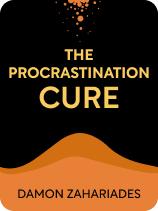

This article is an excerpt from the Shortform book guide to "The Procrastination Cure" by Damon Zahariades. Shortform has the world's best summaries and analyses of books you should be reading.
Like this article? Sign up for a free trial here.
How do negative emotions affect procrastination? How can you use emotional regulation to overcome procrastination?
In The Procrastination Cure, Damon Zahariades considers possible psychological sources of procrastination. He presents several models of how a task that stirs up strong emotions or triggers negative thoughts can lead you to procrastinate.
Keep reading to learn about the psychological roots of procrastination, emotional regulation’s role in defeating the habit, and how negative self-esteem stalls tasks.
1. Fears Are Holding You Back
Zahariades suggests that fear is the emotional culprit behind most procrastination. Emotional regulation is a helpful way to overcome procrastination, but certain fears get in the way:
- Fear of failure: When a task involves something you don’t have much experience doing, you don’t believe you’re good at, or that reminds you of a past experience that went badly
- Fear of success: When you’re not sure you can live up to high expectations, you feel you haven’t earned your success, or you’re nervous about what might come after success (like a bigger workload or more intense scrutiny)
- Perfectionism, or fear of imperfection: When the risk of a less-than-perfect outcome is so unbearable that you avoid the task altogether
(Shortform note: While many procrastination experts agree that fear of failure, fear of success, and perfectionism are three major causes of procrastination, some identify additional explanations as well. In The Now Habit, Neil Fiore attributes procrastination to a sense of frustration and powerlessness and says that not doing a task becomes a way of reclaiming control. In Procrastination, Burka and Yuen similarly argue that procrastination can be a way of rebelling against rules and restrictions that feel oppressive.)
To help you overcome these challenges, Zahariades suggests shifting your perspective, or applying logic to expose your anxiety as irrational:
- Reframe failure as useful information that your approach isn’t working, which gives you a chance to make adjustments.
- Be specific about your fears, and evaluate how realistic they are.
- Recognize that the difference between a perfect outcome and an almost perfect one is negligible.
- Reflect on how perfectionism stresses you out and prevents you from taking action. Then ask yourself why you need things to be perfect.
(Shortform note: Zahariades’s recommendations about overcoming your fears may require a profound change in your mindset that might take time and practice. His recommendations about using logic to challenge your irrational anxieties are similar to techniques employed in Cognitive Behavioral Therapy (CBT). In CBT, a clinician typically works with a patient for three to six months to instill healthy thinking habits that the patient must practice consistently.)
2. Negative Self-Talk Is a Barrier to Action
Zahariades says negative self-talk—when your internal voice is critical or full of worry—can trigger procrastination by undermining your self-confidence, making you reluctant to act. You can combat negative self-talk by disputing it and replacing it with a more realistic perspective.
(Shortform note: In his self-help book Unfu*k Yourself, Gary John Bishop explains that negative self-talk can operate at the level of your unconscious, influencing your thoughts, feelings, and actions in a way that prevents you from realizing your goals. He says that you can take control of your self-talk by switching your inner monologue from narrative mode—when you passively observe events and assign meaning to them—to assertive mode, in which you actively choose to think empowering thoughts, like “I got this.”)

———End of Preview———
Like what you just read? Read the rest of the world's best book summary and analysis of Damon Zahariades's "The Procrastination Cure" at Shortform.
Here's what you'll find in our full The Procrastination Cure summary:
- Advice from a former chronic procrastinator on how to stop procrastinating
- How to get to the bottom of what drives you to procrastinate
- How to use lists and schedules to manage your time and tasks






